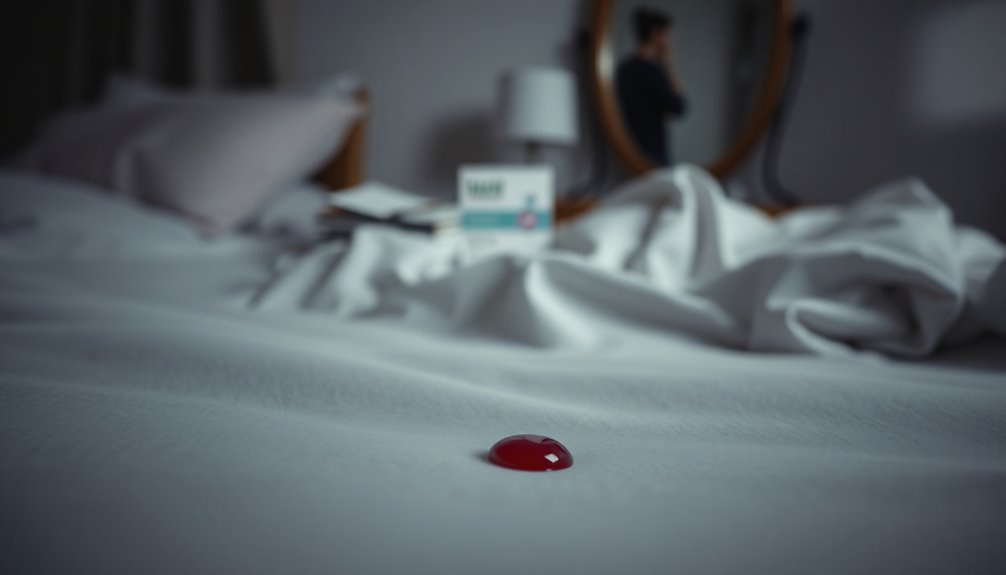Bleeding after sex can be concerning, and it's not something to ignore. Common causes include cervical polyps, infections like STIs, or even hormonal changes. If you're experiencing vaginal dryness due to menopause or insufficient arousal, that can also lead to bleeding from friction. Stress and anxiety can further complicate things. While occasional light bleeding might be normal, consistent or heavy bleeding definitely signals you should check in with a healthcare provider. Understanding your body is essential, and there's a lot more to learn about potential causes and the steps you can take to address your concerns.
Key Takeaways
- Postcoital bleeding may result from cervical polyps or cervicitis, often linked to infections like STIs.
- Hormonal changes, especially during menopause or from birth control, can lead to vaginal dryness and friction-related bleeding.
- Insufficient lubrication or lack of foreplay may cause trauma during sex, increasing the risk of bleeding.
- Persistent or heavy bleeding after sex should be evaluated by a healthcare provider to rule out serious conditions.
- Emotional factors such as anxiety may also contribute to sexual health issues, including postcoital bleeding.
Understanding Postcoital Bleeding

Understanding postcoital bleeding is vital, especially since it can affect up to 9% of individuals with periods. This bleeding can stem from various factors, such as cervical polyps, cervicitis, or hormonal changes.
If you've experienced bleeding after sex, it's important to evaluate potential causes like vaginal dryness, which often occurs due to menopause or insufficient arousal, leading to irritation and discomfort.
Additionally, sexually transmitted infections (STIs) like chlamydia and gonorrhea can inflame the cervix, causing postcoital bleeding. Conditions like cervical ectropion may also contribute to increased sensitivity and bleeding during intercourse.
If you notice persistent or heavy bleeding, don't hesitate to consult your healthcare provider to rule out more serious issues, ensuring your health and peace of mind.
Common Causes of Bleeding

Experiencing bleeding after sex can be unsettling, and it's important to identify the common causes behind it. One frequent culprit is cervicitis, an inflammation of the cervix often linked to sexually transmitted infections like chlamydia and gonorrhea.
Another possibility is cervical polyps, small non-cancerous growths that can lead to postcoital bleeding.
Vaginal dryness, especially during menopause, can cause irritation and discomfort, resulting in bleeding.
Additionally, trauma from insufficient lubrication or lack of foreplay may lead to friction-related bleeding.
If you're experiencing bleeding after sex, understanding these common causes can help you address the issue and seek appropriate medical advice when necessary.
Always prioritize safe sex practices to reduce the risk of infections.
Risk Factors to Consider

Bleeding after sex can be influenced by several risk factors that you should be aware of.
If you have cervical inflammation from infections like chlamydia or gonorrhea, you're at a higher risk of experiencing bleeding.
Cervical polyps, which are benign growths, can also cause postcoital bleeding, especially if irritated during intercourse.
Hormonal changes related to menopause or hormonal birth control can lead to vaginal dryness, increasing your chances of bleeding.
Additionally, if you've experienced trauma during sex due to lack of lubrication or vigorous activity, you might be more susceptible.
Finally, a history of sexually transmitted infections or conditions like endometriosis can elevate the likelihood of bleeding after sexual activity, impacting your overall health.
When to Seek Medical Attention

If you experience persistent or heavy bleeding after sex, it's important to seek medical attention right away.
Pain during intercourse or unexplained bleeding episodes shouldn't be ignored, as they could signal a serious issue.
Don't hesitate to consult a healthcare provider if you notice any of these symptoms.
Persistent or Heavy Bleeding
Persistent or heavy bleeding after sex can signal serious underlying health issues that require immediate attention. Conditions like cervical cancer or sexually transmitted infections may be at play, so don't ignore the signs. If you experience heavy bleeding along with severe abdominal pain, fever, or unusual discharge, seek medical evaluation promptly. Monitoring your symptoms is vital, as excessive blood loss can lead to complications like iron deficiency or anemia. Regular gynecological check-ups are essential for maintaining reproductive health and catching issues early.
| Symptoms to Monitor | Action Needed |
|---|---|
| Persistent bleeding | Seek medical evaluation |
| Heavy bleeding | Contact your healthcare provider |
| Severe abdominal pain | Go to the emergency room |
| Unusual discharge | Schedule an urgent check-up |
Pain During Intercourse
Experiencing pain during intercourse, also known as dyspareunia, can be a sign of underlying issues that need attention. If you encounter this discomfort, especially when accompanied by bleeding after sex, consider seeking medical evaluation.
Watch for these signs:
- Persistent pain that doesn't improve with over-the-counter lubricants
- Sudden onset of severe pain, especially if new or worsening
- Symptoms of vaginal dryness or irritation
- Signs of cervical infections or polyps
Addressing these concerns is crucial for your reproductive health. Ignoring them may lead to complications, including undiagnosed infections or conditions like endometriosis.
Don't hesitate to consult a healthcare provider if you experience any of these symptoms; early intervention can make a significant difference.
Unexplained Bleeding Episodes
Bleeding after sex can be alarming, especially when it's unexplained. It's crucial to seek medical advice if you experience persistent or severe bleeding, as this could indicate serious underlying conditions like infections or cancers.
If you notice bleeding alongside symptoms like fever, unusual discharge, or sudden pain during intercourse, don't hesitate to get immediate medical attention.
Common causes of vaginal bleeding include cervical ectropion and abnormal uterine bleeding, but only a healthcare provider can accurately diagnose the cause.
Keep a record of your bleeding frequency, duration, and any associated symptoms to help your doctor.
Regular gynecological check-ups are important health tips for monitoring your reproductive health and catching potential issues early.
Stay aware of your health history to guide proactive management.
Diagnosis and Treatment Options

When you notice bleeding after sex, it's essential to seek a thorough diagnosis to uncover any underlying issues. A pelvic exam, STI testing, and imaging tests, such as transvaginal ultrasounds, may be necessary to identify the cause.
Treatment options can include:
- Antibiotics for infections
- Hormonal therapies to regulate menstrual cycles
- Surgical interventions to remove cervical polyps
- Lubricants or estrogen therapy for vaginal dryness
Regular gynecological check-ups are important for monitoring your reproductive health.
If you experience persistent or severe bleeding, don't hesitate to get immediate medical attention, as it could indicate serious conditions like cervical or uterine cancer.
Prioritize your health and consult a healthcare professional for guidance.
Prevention Strategies

To effectively prevent bleeding after sex, implementing a few simple strategies can make a significant difference.
Start by using water-based lubricants during sexual activity to reduce friction and prevent vaginal irritation, a common cause of bleeding after sex. Engaging in prolonged foreplay can also enhance arousal and natural lubrication, minimizing the risk of dryness.
Additionally, scheduling regular gynecological check-ups helps detect and address any underlying health issues, such as cervical polyps or infections, before they lead to bleeding. It is also important to consider the impact of emotional support on sexual health, as stress and anxiety can contribute to physical issues.
Practicing safe sex, including using condoms, reduces the risk of sexually transmitted infections that may cause inflammation.
Finally, be aware of your menstrual cycle and avoid sexual activity close to your period to further minimize the risk of postcoital bleeding.
Emotional and Physical Support

Taking steps to prevent bleeding after sex is important, but equally essential is recognizing the emotional and physical support you may need to navigate any concerns that arise.
Surrounding yourself with a strong support network can help alleviate anxiety and foster open communication about your sexual health. Consider:
- Seeking emotional support from partners and friends
- Joining community support groups focused on sexual health
- Engaging in self-care practices like stress reduction techniques
- Consulting healthcare providers for accurate information
These actions can enhance your emotional well-being and resilience.
Don't hesitate to seek counseling or therapy if needed, as they can address psychological factors contributing to distress.
Frequently Asked Questions
Is It Normal to Bleed a Little After Sex?
Isn't it a bit unsettling to notice some bleeding after sex?
While light bleeding can be normal for many, it often stems from harmless factors like vaginal dryness or minor friction during intercourse.
You might also experience it due to hormonal changes or even cervical issues.
However, if you find the bleeding persists or becomes heavy, it's wise to consult a healthcare provider to rule out any underlying concerns.
Why Am I Bleeding During Sex but Not My Period?
If you're bleeding during sex but not on your period, it could be due to several factors.
You might be experiencing cervical ectropion, which makes the cervix more prone to bleeding.
It's also possible that cervical polyps or infections like cervicitis are causing the issue.
Vaginal dryness can lead to irritation, too.
Finally, trauma from friction during intercourse might be the culprit.
It's best to consult a healthcare professional for a proper diagnosis.
Can Hitting the Cervix Cause Bleeding?
Did you know that around 10% of individuals experience postcoital bleeding?
Yes, hitting the cervix can cause bleeding, especially if there's insufficient lubrication or if penetration is too deep. The cervix is sensitive, and direct pressure can lead to irritation or minor trauma, resulting in bright red bleeding.
If you notice this happening frequently or if it's accompanied by pain, it's best to consult a healthcare provider for further evaluation.
Is It Normal to Bleed After but Sex?
It's not uncommon to experience some bleeding after sex, but it shouldn't be a regular occurrence.
Light bleeding could happen due to various reasons, like cervical irritation or dryness.
However, if you find yourself bleeding frequently or if the bleeding is heavy, it's important to consult a healthcare professional.
They can help determine the cause and guarantee there aren't any underlying issues that need to be addressed.
Always prioritize your health!
Conclusion
If you're experiencing postcoital bleeding, you're not alone, and it's important to remember that many others have faced this concern too. It can feel unsettling, but understanding the potential causes can empower you. Don't hesitate to reach out for medical advice if you're worried; your health matters. By seeking support and information, you're taking a strong step towards reassurance and healing, connecting with countless others who've navigated this journey and found their way back to comfort.










